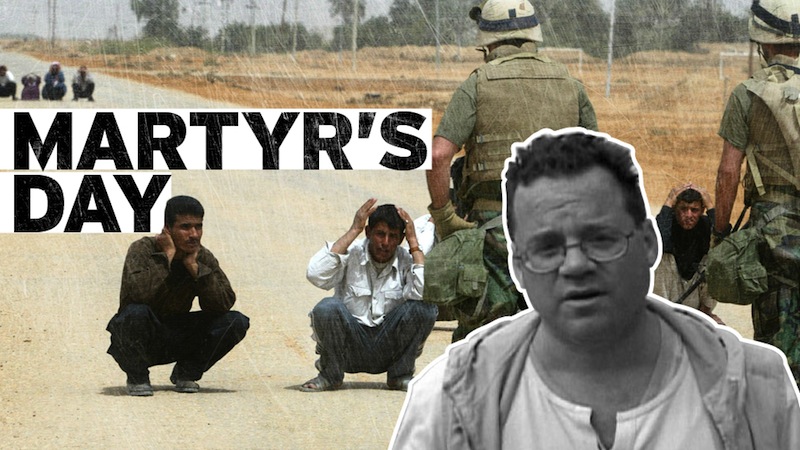TOM SCOCCA | Gawker
Ten years ago today, somewhere south of Baghdad, the editor and columnist Michael Kelly became the first journalist to die in the invasion of Iraq. His Humvee, reportedly under fire, went off the road and rolled into a canal. And there, inside some two and a half tons of the world’s finest military equipment, he drowned.
Writing the news in the New York Times, the reporter David Carr added, “The driver was also killed.”Â
War is stupid. War kills people. War kills people in stupid ways, and in unanticipated ways, and in multiples. These are not complicated facts, but they were too complicated for Michael Kelly. They were too complicated for a lot of people, 10 years ago and, despite everything, remain so even now. Kelly’s wrongness about war, though, was loud and it was authoritative, and it is still out there being received as wisdom–the wisdom possibly of a saint, martyred to the cause of journalism.
It is essential for any number of reasons to say here that Michael Kelly’s death was a painful loss for many good people. He was beloved by the people who worked with him and for him, and many fine journalists feel personally and professionally grateful for his kindness and generosity. He was by all accounts a devoted son, husband, and father.Â
But: The driver was also killed. And so were more than 4,400 other American troops. And so were more than 200 other journalists and their assistants. And so were an uncountable number of Iraqis–so many that we do not even know how many tens of thousands of them there were, each one as alive and individual and human as Michael Kelly was.
Most of them did not leave as clear a record of their thoughts as Michael Kelly did. Here are a few of Kelly’s writings, composed and published as a bad and foolish idea was becoming an inevitable fact of history:
We are in a position of triumph, and potentially much greater triumph. A few months ago, all was still in tatters. Hussein still defied with impunity, still ruled unchallenged over his torture state, still schemed to advance his dreams of himself as the atomic Saladin… The will of one man, George W. Bush, changed all this.
[H]undreds of thousands of marchers–and many more millions who did not march–believe quite sincerely that theirs is a profoundly moral cause, and this is really all that motivates them. They believe, as French President Jacques Chirac recently pontificated, that ‘war is always the worst answer.’
The people who believe what Chirac at least professes to believe are, in the matter of Iraq, as wrong as it is possible to be. Theirs is not the position of profound morality but one that stands in profound opposition to morality.
Tyranny truly is a horror: an immense, endlessly bloody, endlessly painful, endlessly varied, endless crime against not humanity in the abstract but a lot of humans in the flesh. It is, as Orwell wrote, a jackboot forever stomping on a human face.
…[A]ny rescue of a people under the boot (be they Afghan, Kuqaiti, or Iraqi) is something to be desired. Even if the rescue is less than perfectly realized. Even if the rescuer is a great, overmuscled, bossy, selfish oaf. Or would you, for yourself, choose the boot?
Remembering Kelly yesterday–as a foe of “the pompous, the dishonest, the phony, the self-satisfied, the morally safe and smug, the debauched, the downright evil”–Bret Stephens of the Wall Street Journal praised the clarity and force of that jackboot column:
In all the arguments about the war, both before and after Kelly’s death, I have never seen this basic moral point convincingly refuted by anyone.
Let me try. While we are hypothetically choosing what to do with our faces, would Bret Stephens prefer that his be metaphorically stomped on by a metaphorical jackboot–or that it be literally stabbed with a literal power drill, over and over, blood and bone spraying everywhere till the life ebbed from his agonized and mutilated body? Because that is what some Iraqis got out of the deal, in fact. That was their less than perfectly realized rescue: torture, chaos, horror, and death. Barbers murdered by vigilante religious fanatics for the crime of cutting hair. Total and shapeless war.
A decade before, Kelly had written a sharp book, Martyrs’ Day, about the absurdity and savagery he’d observed during a “small war,” the spell of combat we now erroneously refer to as the first Gulf War. But by 2003, he was too pompous and self-satisfied to see any real trouble coming. He had retreated into the strange cartoon world of Washington politics and punditry, in which you are considered a hard-nosed realist if you believe that armed force solves problems, and a useless idealist if you believe armed force might create new problems.
Kelly devoted a column to his contempt for the Clinton administration’s Iraq policy and the “deep and subtle and clever people” who had maintained that sanctions were weakening Saddam Hussein’s regime. “I am thankful that we live in reality again,” he wrote, praising the “accruing foreign policy triumphs of the Bush administration.” Under Clinton, he wrote, Iraq had “waged a war of attrition against the United States…almost daily firing on warplanes assigned to patrol the peace.”
As long as people are invoking Orwell, “patrol the peace” is a particularly impressive construction. This is the falsehood from which all the other falsehoods followed: that the “Gulf War” had ever ended. After our armed forces pushed Iraqi forces out of Kuwait in 1991, the United States did not make peace. Instead, we settled into a state-of-the-art version of the ancient and brutal form of warfare called the siege, using our overwhelming advantage in air power to slowly crush and starve the enemy.
It was cruel, and it was cruellest to ordinary Iraqis. Our practical-minded war poets, agitating for the invasion, were shocked and offended by the evidence that in a dictatorship, the dictator is the last one to feel hunger. The regime, Kelly wrote, “was able to stay perfectly fat–and with enough cash left over to support palace building and weapons building, and still afford brand-name Scotch.”
Or perhaps not enough cash for weapons building, it turned out, once the invading troops got to the palaces. Details! But warfare is nothing if not a matter of details. People who supported the invasion of Iraq and now regret the results tend to say that it was a good idea that was badly planned or poorly managed. Yet there was no idea but the planning and management of it. The decision to invade was not a change of principles, a repudiation of mushy-headed pacifism and appeasement; it was a change of strategy.
Even that gives it too much credit. It was half a change of strategy, really: regime change with nothing to change it to; an invasionary force without a plan for occupation; an open-ended commitment of military personnel by a nation too politically cowardly to draft enough bodies to do the job. Thousands of reservists and National Guard troops found themselves serving multiple tours abroad, trapped in what Kelly had envisioned as “total limited war…brutally effective in its killing power while being miserly of American life and property.”
“You go to war with the army you have, not the army you might want or wish to have at a later time,” Donald Rumsfeld said, thereby sparing Kelly and Andrew Sullivan and everyone else in the press from the shame of having said the single most fatuous and destructive thing about the invasion of Iraq. It is hard to find a shorter, clearer description of how wars are not won. The United States did not attack Berlin or Tokyo with the army it had in December of 1941. The U.S. Navy did not sail up the Thames in 1812. You fight the battles you can win with the army you have.
That Kelly was brave in going to cover the combat does not change the fact that he chose to be bold with other people’s lives. It was time to do something about Iraq–“to turn, as swimmers into cleanness leaping,” as Rupert Brooke wrote in 1914, in a sonnet celebrating the chance to go fight the Great War. A year later, Brooke died of an infected mosquito bite on a troop ship, taking his place among the 16 million corpses.
The premise of Kelly’s argument for invasion was that escalating the war, carrying it to Baghdad on the ground, would settle the problems “easily and quickly.” Like his fellow poets, Sullivan and Christopher Hitchens, he presented his romantic vision as clear-eyed advice. Evil must be opposed. Good would triumph. Anyone who disagreed was benighted, mistaken, immoral.
In the jackboot column, Kelly remembered Kuwait City “shot up, blown up, torched and, of course, thoroughly looted,” and its civilians “ritualistically humiliated (forced to urinate on the Kuwaiti flag or on a photograph of the Kuwaiti emir, for instance), robbed, beaten, raped, tortured”–the work not just of “Iraq’s terrible special security units” but “enthusaistic amateurs,” “poor-boy soldiers.” With a few proper nouns adjusted, it could stand in for reports from post-invasion Iraq: Charles Graner, the Special Police Commandos, the Mahdi Army, Haditha, Mahmudiyah. Less than perfect.
Remembering Kelly in 2004, the editor of his posthumous collected works, Things Worth Fighting For, wrote about the mystery of “the two Michaels”–the subtle reporter and the hectoring columnist. There were more like three Kellys: the loving and loyal personal Kelly; the impish, incisive, and sometimes courageous observer; and the nasty, often petty polemicist, who wrote things for effect that he knew were untrue. But they blended into each other, and not to his benefit.
It was Kelly’s notion of collegial devotion that led him to brutally defend his New Republic protege Stephen Glass, past the bitter end, refusing to concede to Buzz Bissinger that a smear Glass had written about the healthy-eating activist Michael Jacobson, in a story admitted to have been fabricated, was inaccurate.
When interviewed, Kelly said that he would gladly apologize to Jacobson for the opening anecdote–as long as he was given definitive proof of its embellishment.
So he shared with Sullivan, who had originally hired Glass, the distinction of an active role in two of the worst failures of journalism in a generation. Perhaps, like Sullivan, he would have changed his position on Iraq, had he lived to see our military might losing control, the easy liberation collapsing into hell, Saddam’s torture prisons reopening with American torturers. What might he have written, if he’d had the chance to engage with the terrible truths of this past decade? What might a hundred thousand other people have done, if they’d lived too?
It’s not simply that Kelly was wrong, nor that he was wrong about important things. It’s that he was aggressively, manipulatively, and smugly wrong: deep, subtle, and clever…pontificated…we live in reality again. He knew better. His old colleagues are remembering him today by urging people to read Things Worth Fighting For, the one with the jackboot column and his other war-boosting. Do Kelly a favor and try Martyrs’ Day instead. Here’s what he wrote there, and then, at the Jordanian border, when he was witnessing war rather than arguing for it:
A woman was sitting by herself, holding a baby on her lap and weeping steadily. A reporter who saw this wrote her up in his story as crying for joy at having escaped Iraq. It turned out that this was a mistake. She was crying because the baby in her lap was dead.
[Sources photos: Getty/ABC News Nightline]
Gawker dishes the nation’s most current and cutting gossip across media, entertainment, technology, and business. Founded in 2002 and namechecked frequently in mainstream publications, the site is essential reading for those who want big media hypocrisy debunked and faux-sincerity exposed, all with a healthy dose of snark.











